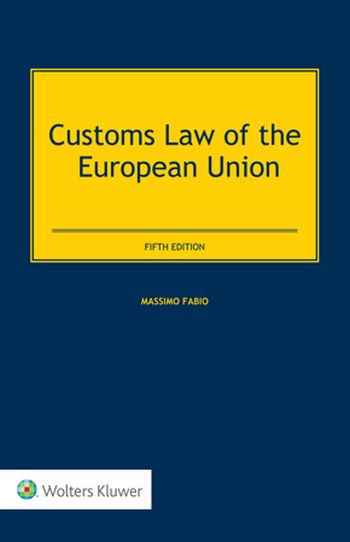We are now closed for the Christmas and New Year period, returning on Monday 5th January 2026. Orders placed during this time will be processed upon our return on 5th January.

The device(s) you use to access the eBook content must be authorized with an Adobe ID before you download the product otherwise it will fail to register correctly.
For further information see https://www.wildy.com/ebook-formats
Once the order is confirmed an automated e-mail will be sent to you to allow you to download the eBook.
All eBooks are supplied firm sale and cannot be returned. If you believe there is a fault with your eBook then contact us on ebooks@wildy.com and we will help in resolving the issue. This does not affect your statutory rights.
Customs Law of the European Union gives a practical overview of the customs and trade laws of the European Union (EU). Today, global competition obliges companies dealing in international trade to modernize their procedures of delivery and to operate adequate customs planning in order to minimize the customs burden and simplify the relation with customs authorities. However, customs officials are facing new challenges to ensure the smooth flow of trade while applying necessary controls on the one hand and protecting the health and safety of the Community’s citizens on the other. To achieve and maintain the correct balance between these demands, control methods are constantly evolving thus posing major challenges to those charged with planning and compliance.
What’s in this book:
The ongoing global revolution brought about by new trade policies, aimed at reaffirming protectionist theses, is reshaping the international customs ecosystem. The choice to privilege unilateral relations is determining a new complexity in commercial exchanges for the success of which every action related to the management of customs relations in each country involved is now dramatically central.
The volume represents a practical operational tool to effectively manage every operation that generates a customs debt. In particular, in this new edition, the aim is once again to put the operator in a position to make the best use of the most recent EU regulations, in order to understand all the possible advantages from which one’s company can legitimately benefit, both in terms of cost reduction (customs and business in general) and in terms of streamlining the administrative and accounting procedures through the use of the customs procedure deemed most suitable, also in order to avoid the occurrence of irregularities.
The new edition takes into account the recent entry into force of the Union Customs Code (EU Reg. No. 952/2013 of 9 October 2013 – UCC), declining all the procedural and substantive innovations. In this regard, the text contemplates the global reconsideration of the customs relationship due to the introduction of the new Union institutes and special regimes, as well as the electronic clearance systems ECS (Export Control System) and EMCS (Excise Movement Control System), on the subject of excise duties. Great importance was still given to the peculiarities of the AEO (Authorized Economic Operator) regime and to the exclusive opportunities that now the particular status – together with that of CTP (Certified Taxable Person) will be able to grant only to companies certified in international transactions, due to the new provisions of the UCC. The text illustrates practical cases on controversial aspects of the application of the Union rule, such as royalties on imports, the regulation of ‘virtual’ deposits, the determinations of origin.
The discipline of ‘made in’, also for the new criticalities induced by the so-called Trade Wars is examined with a view to highlighting the opportunities granted by the Union rules to overcome the protective duties placed on goods from certain countries in trade conflict. The criticalities of the movement of goods with preferential origin are also examined. Furthermore, the manual contemplates the operational solutions for the customs reconciliation of Transfer Pricing adjustments, advocated by the World Customs Organization and the International Chamber of Commerce. With regard to the Union landscape, the text offers insights on the issues of Brexit and Quick Fixies in the field of Community VAT.
How this will help you:
Lawyers, Practitioners, in-house counsels, government officials and academics will find this a practical handbook for grasping the scope and breadth of the European Community’s common commercial policy, and they will continue to find this book to be a valuable resource. This book will be a great contribution for the dissemination of latest developments of customs legal framework and a reference for any practitioners interested in the subject.